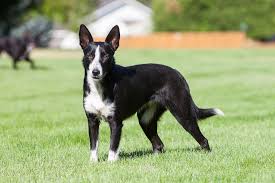
McNab
Conditions of detention
McNabs are highly adaptable and can live in various environments, including rural areas and suburban homes. They require plenty of space to exercise and thrive in homes with large yards or access to open spaces.
Useful Fact: McNabs are well-suited for active families or individuals who can provide them with regular physical and mental stimulation.
Nutrition and diet
A balanced diet of high-quality dog food appropriate for their age, size, and activity level is ideal for McNabs. Their diet should include all essential nutrients to support their high energy levels.
Useful Fact: Due to their active lifestyle, McNabs may require a diet higher in protein to maintain muscle mass and energy.
Health
McNabs are generally healthy dogs, but like all breeds, they can be prone to certain genetic conditions such as hip dysplasia and eye problems. Regular veterinary check-ups are essential to monitor their health.
Useful Fact: Early screening for common genetic conditions can help manage and treat potential health issues.
Grooming and care
McNabs have a short, dense coat that is relatively easy to maintain. Regular brushing helps remove loose fur and keep their coat healthy. They shed moderately, and their grooming needs are minimal.
Useful Fact: Regularly checking and cleaning their ears can help prevent ear infections, which can be common in active dogs.
Education and training
McNabs are highly intelligent and eager to please, making them relatively easy to train. Positive reinforcement methods work best. Early socialization and consistent training are crucial to harness their herding instincts.
Useful Fact: McNabs excel in obedience and agility training, and they often participate in dog sports and herding competitions.
Toys and entertainment
These active dogs enjoy a variety of toys, including fetch toys, chew toys, and puzzle games. Regular playtime and mental stimulation are important to keep them happy and healthy.
Useful Fact: Interactive toys and games that challenge their problem-solving abilities can keep McNabs engaged and prevent boredom.
Safety
Ensure your yard is securely fenced, as McNabs are curious and energetic. Always use a leash when walking in unsecured areas to prevent them from wandering off.
Useful Fact: McNabs have a strong herding instinct, so it’s important to train them to recall reliably to prevent them from chasing after cars or other animals.
Accessories
Basic accessories include a comfortable collar, leash, and identification tags. They also benefit from a sturdy harness, a cozy bed, and appropriate-sized crates if crate training.
Useful Fact: A harness can be especially useful for McNabs during walks, providing better control and reducing strain on their neck.
Socialization
Early and ongoing socialization with people, other dogs, and various environments is important for McNabs. This helps them grow into well-rounded and confident dogs.
Useful Fact: Puppy socialization classes can be a great way to introduce your McNab to new experiences in a controlled environment.
Travel and Transportation
McNabs are good travelers if accustomed to it from a young age. Use a secure crate or a seatbelt harness for car rides to ensure their safety.
Useful Fact: Regular breaks during long trips help keep your McNab comfortable and reduce travel stress.
Behavior and psychology
McNabs are known for their loyalty, intelligence, and strong work ethic. They form strong bonds with their families and thrive when they have a job to do or regular activities to keep them busy.
Useful Fact: Understanding their need for mental and physical stimulation can help prevent behavioral issues such as anxiety or destructive behavior.
Legal aspects
Ensure compliance with local pet ownership laws, including licensing and leash regulations. Keep their vaccinations and identification up to date.
Useful Fact: Some areas may have specific regulations for working breeds, so it’s important to stay informed about local laws.


